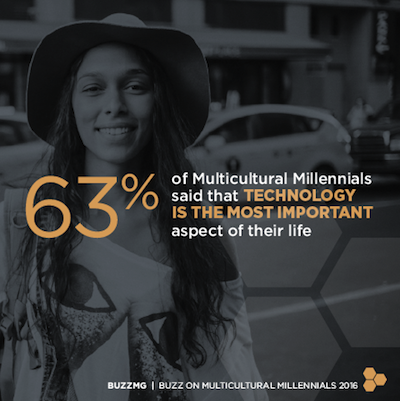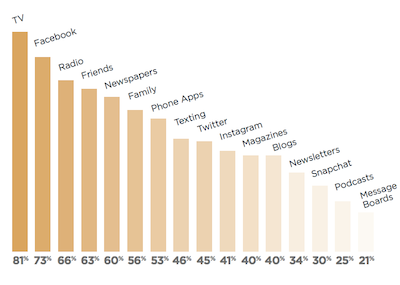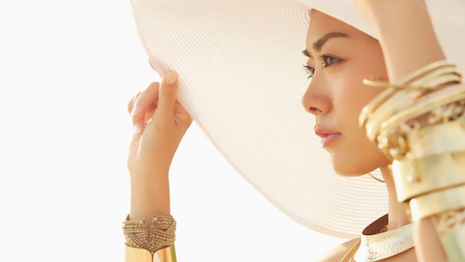Multicultural millennials may have a wider range of options to bring their business to, but 95 percent of the demographic claims to be loyal to the brands they have an affinity for, according to Buzz Marketing Group.
The Multicultural Millennial Study revealed that luxury brands are missing out on a significant and loyal audience, with most claiming to be brand loyal but 82 percent wishing more brands would advertise to minorities.
“Multicultural millennials are loyal to brands that they like and would like the same in return,” said Marcus Wells, vice president of research and planning at Buzz Marketing Group. “Ninety-five percent said that they are loyal to brands that they like and 82 percent would like to see more brands focus their marketing and advertising on minorities.”
Buzz Marketing Group surveyed 400 men and women from various cultural backgrounds, aged 21-36 living in the United State regarding their opinions on attitudes about advertising, influence, social activism and media.
Millennial loyalty
Brands who are targeting minorities are garnering more attention from multicultural millennials, and others should follow suit. The demographic will pay for quality products if they are in their price range, but also share their recommendations and influence with friends, family and peers.
Luxury brands are by no means out of the question for the millennial multicultural consumers, but not under frivolous guises. Only 24 percent of the demographic will purchase luxury items above their budget, even though they are interested in the products.
The more targeted a brand’s advertising is to an ethnicity, the more popular it will be with the multicultural millennial. For instance, 72 percent of respondents think highly of a brand that caters directly to their demographic and prefer it.

Courtesy of BuzzMG
Making a public stance on important issues is another major influencing characteristic from brands when it comes to multicultural millennials. More than 83 percent are partial to brands that take a prominent standpoint on various issues they believe in.
Social media is a highly influential driver in social causes, with hashtags becoming a prominent tool with important causes. About 61 percent of respondents claimed to have used a hashtag to support an important cause on social media, making technology a big driver in social climate.
But only 28 percent have actually participated in a boycott.

BuzzMG's graph
Another study from Cue Connect looked to get inside the mind of millennial shoppers showed that while social issues are important, when shopping online, millennials in general most desire the capability to follow their favorite brands for sales, with 66.7 percent identifying that feature as their top wish.
Sale messaging is a way to prompt purchases from millennials, as 57.4 percent say that receiving a discount code from a retailer makes them more apt to buy. Additionally, 55.5 percent say that the perceived value of a retailer goes up if it has the best price for a particular item online (see more).
Power of influence
Multicultural millennials are highly aware of their power of influence on their peers and others around them, with 95 percent believing friends and family view them as an influencer. However, only 78 percent believe that they have the power to influence brands.
More than 60 percent admitted to technology being the most important aspect of their life.
Marketers spend an enormous amount of time and effort attracting millennial attention, when in reality the demographic will only spend approximately $49 billion across luxury categories in 2016, according to another report by YouGov.
The older generations, the baby boomers and Generation Xers, control the “lion’s share” of luxury spending across nine categories, which include apparel, travel and personal care, among others, for a combined spend of $215 billion for the year. In the inaugural “2016 Affluent Perspective Global Study,” presented in New York on May 3, YouGov forecasts affluent spending, the difference between the two main demographics and how each approaches and interacts with luxury brands (see more).
“86 percent like it when celebrities take a public stand for or against issues they believe in and 83 percent like it when brands take a public stand for or against issues they believe in,” Buzz Marketing Group's Mr. Wells said.
{"ct":"waZKrGtVJvKi3DILTUxq0h0SoygFcZVyi+XK5eMdYh1+JopxWJZkUXVHXlvLO9UWKjG264CzcYRhFxSAYGE7NRfzLbdz4YUMo5Uq\/uHUN6oJYbyTe9mAb62UhqlR\/zT6EFcrL6G4uP7nNJy\/m0S6tcRptGhxmzi0prWiKTDZosrV9N4\/\/I976SK8OItpaVMpw8dfK52oqlSeTTCgdJ7EI470NpTHFrYj8NDZVm+GUdT1mM1SgSiaZWVrel1iX6XqOlrmkOe6oAZzrDlLp137gkRlpyw0r\/0Ym99Pc9C7\/+Q0RV1ISuWJIpKnjmPOh5KtrPYqes1LKGVOPDouQi2fu2ul6SRiIWRc0SsAV7GfimwkLLQAAskWX\/ryHwo8vDZo5\/3Dlnj+Wf+Fl30hfEBmOKcAesblrvaY6S3I0nBtSQRXsgLbdDZU9SD830cuD85OWIrr7Yh3F9Ifqyw686mNbtOcvCuKDZZJ3TxCg0EugS1vnpyemEqwKdcYo11ycVZWp9HlcTKli7aCb\/zvLO\/XPCEMxl+4RkwCcanUScaynWKWDxFHLZ5gYHu\/YE8W+OrCJIgx\/u58weRo8kYai5IYX6ZYn+GgJCFD2YcH1i+1gwSPZNKlj1aNQf8lOInIWmQmcsHJEpOXjSo2HO9OlSIMxPDhCpMZGaRYlnHu9q86ELwgk4ayqnzoBXM+DMdnJnoDaOXSva7biVFT+OPX2vrz1S2dDov0P9vfmrX8l0805N8QUwA60R78eAoYPhArCfwqrnlB5\/SCU2NefWrgk3HHN5bxS+Qz6sSZQ41AJZMN7uUNhn0itBnWmjT9Mqili3ByeAqWDLYtvtqVqsEHwAo7RY6ryK7RExoZhOUg1RvZro8i8JDvalcWeoOp5WCV2yorpHBAxwgAyXOqY3uTF1\/acrKC9kJkBxt\/EcuthtM2XwxIkNjwD7qQqKJg0WIYe4iJowk3vJ8gQAMfFvLrLBAavjfUOPUj\/unm1yZThoU6e3mwYlvZUttAF5nLtI\/bpevkbZ0DSke3clvl336Li4nFltCn\/zLAyPc5cpYpLkrAEIW3ADW5Q9KJBie2bukUOxm7GPrWPK\/tyfiWvHJDeUZkAuGBARlrKdTAl26KelO7YlTKWv9YJppBKO37Ovq87i9B4d7S3DOHjpZLb4ISPjkVKroGq7oDmXuRsA9r7a1SNMqeHY8DxGth1vHtHPOSb5HtcX1bmAfTPw5cThxNhMGPNMRskS\/Ln2\/1TagMBmBin7B5ZZ0703eGuoX0POyPgrSqirewY2ahS2K0A2vqU+NWYduRwsJjQ5s7edn5fdqg+oTKRxPjuy4W9B1KZGvLMatRzI\/Zr8vtJqOLwUB6F0M2oS7eAjkIaKwaA7oxy3KuHFxrXRPVfQ8dgEiQVj8wB0K7IQuO5f6esaJB3w67r2bDxs1zeg\/vFELac59b3e986VO3jNN3oSWxmCa8KfwQtaHt+wVdJw0HtQxr8XxmTCuM8gVRxlABnkSL9T4Th1tyCPzo4Jd+g51nfDLUovWdEvQfJCnCmx4+iSqOR5o92tIwxsZUfEjpQsBedPdqMs3N+25Fb4WJa+TzLpfu6a+MH3Acg3BPmrtezGYiXZOls1irFCiqXKJxY4wOORHWznS41D3hJiWEAIiSUeualwVYXS1UIV9UZdd2opr7QFtvwHlA+M+JJZmMfi8e\/rqiuUzIyiRk4fPyZp7MJxYEbnPXuc4yyz0yWDnVBUWk6K2tmzadst229VYE0visoisY9H+Zlp7brH\/aMJz0hSYYcMR2muxJInJYlJMtpx2x7w4osx7KEdxq7GtGilhNXgdcpwkJ10ZZ3A1BYS0Ms4R5YGfw+GLjSK1KRQ+26BrCqeo6BtdoVoDBfv8n69pVt4Tsh3UIgwExOuvajCepj32rAW23Ztd9NYiKYDINVNWoOy9rL15Bvtt5GsHXzZR17FDqkvxD30J9or\/1cUlH64F0MQvfMXqDKAxzH4EPzyXeL7w\/xu6xY5Qp8Wa3hRoXKVK\/5M4W9qgw9cOi\/mq9vXZ4DfAwoYjx7QUg0SJ4nweINPSluih09MBiffCO0zjF\/DlDAmmOnVnBgTsAcuFPwERXBe2AzYw6LkhIajBG8WVrSfkBImSsGDuCokEBfzYwljtCmchXCasz6OY6LvrGhG6stRJjWm0MZf2Y6uxIY7yRSwF5kvkP8O5Y8n48AL3WqtkQBPgM\/jKTGiH7rxteliFBA2OXMIKgL39LNYcHIXRrwmLTEbtE9JmL5Xjs34RJG1I7Q7\/38kUakJ5Vgr48\/WxVg4tK1rmunOXv4UaLerEFAWHR\/yUGKZWPiaBIu+k4HMzEhRS5hAByXGPE4SSISKQIwVEZRFjFwLIn6VWy0Uc02s0OYGeyozUBTq006DSFNdyxdnEIAVUYHDQYF8d\/2LHlfg0yiFycky4bQyqA90sk4pxTYa1a8+GO1jp14y3vwuHbD2DrNJjFfhlqao0YaRuQXPjxe5uq8wN4KujTXEWCOIYqyrAi3Z4E0G583huZR9G6klptQr84mSOacJX+oPi6rrlNHm\/cgt6GCN8ZtgRtQagDrcMqDcZDQPbdMHHEfAwsxxEZ0A0HYbagepK07WCXOm981gbO\/l2A2s2HZ27CDc7L9kdnHquOyHgjClXJK1sIZ22LckZ\/YpWvXATCek04dXqEWoU42TlH0sPyQ2Q6Y6fmQJzOIlT8IfSh+Ze6rjzFiwsshOMTwUx3+hATqSAtiupVksG7qOWpVKfWvtHwGXfuyVcCi\/Vp22fvXQOD9lG8M3FLAQ97qjbLPRm8RLsXjS9B3r7kGiU3Yy+xCx6AycRqLEgVP47KAA4pOPngEt8FUpATIm2Lwo3uCNP3pGIM9jOjNHeNUFExGuXknOoSQWWhtMvsqN\/Tcb9MCg8Jjvp4tISJcxHoDUjloh+ylMpQ8VLsYbYXZuk0\/BhF5ilBtQkgmNbajbYpJ1Hif5rpPQwxMO1DT3Q57gbzH1B2IbITLAEkhvgYPCoW97CdW3lGOzYfwCogc9RJr\/vjHulxI+sB3dO9yBpAQ344kZhEoMnttnvk6myrzh6gV\/mhmSgazTmVIWSDCsmPMVOHxeTTt8Bp9ouSbxi60J+vN9\/5csUEVqefMp\/PA1zFGMJ4RjDq6b50umL9UtKu8xMOfnKn4LSEr7cnvCWUPMeiHANhu+nPf1aQD0hRC2pktUBQXrc24LS+vg4\/h\/i8ido\/7SmHOqj+J7gttU0Eda4JC9IwO9QHdpT\/tTU1II4ejR3Ujtc6Jhw0sVDwGhucPf3O4NlYXaQBuO\/ANhuX9RovNwgqP2rFtwwlWHuvQexTu\/h9cWq6zIbBN9i8cUMsr2iz5JSXsAB1XyVIi+DKhqaoOVLofTNQtOgmvJvMGRr1Zxv90jztmOzD+p5st2BcB9C4GsNtoB6uI1uz2FlSYuUVEsZk9XcxgyonM+4hXumZcvvuUpaZSurVzJWKgcFzKEF7HCUVb1WrwlPIAnEI5af72w2EY3yjyMGejqugyUkkztDYhLYrXKnnnSaMo5f+sNT8ln8HOZDVoKYIOLzYjWfBE4H5P4K1CTzqKADIWBJaqk6EwjYAxtYj0LCKEPwoTumIZNiNz4WcwyPw8ro+PgF85qEbP7JC1LGj0bOT0E90ZnbUdY17v2bmMNzvUg9u3x\/nVTBZdTNY8Amuj8Em4rxtIK0SUYAGiNOA3SqddhdZcqlHrwmqJ2YOzUyax6sd8yv9Y0M7W+YdFV9A527QsQM725dOhQkGfUpKcEovVtDdt15cX\/2dXSQ\/lEwOrRwtX0hir7XPcRm\/btVkjnYuu6YZMpEoNlY7\/d6VwamIqtFb5gWF5G\/klSy7G3vQ7xijsrq1iN8uyK9WLdogF4ZzEWsXW4ZVL5rybn3w+qcjcMBh8SiAjUjsxyz1uMREjxwau3QURlROo9DnvZdCNwy3Hk5NZsgqy4k2ImwlC92FIOhwcQdhO1Dk3x6rEe0TB\/EkAHtLvBeNoymOGFHcBbZKOOMkY4t1WQayTXFisch3j8tOOYBGG75XTC5hawonGSuc9P\/JtV2ti+U3AowFM5EAEYR2JRVaxAEfKKwB0dLYnmL61WoaiUGhOYUEUHJ5dvtDdXuhkJFDoqdaOgWS1hqPQRfYlA83zaNGUtELGyuCIkaCznZQU+y05CT36Zs4bwa0G8FmlSiBrX6g8pVaXz19DKtq7kkwnv\/Rhx9nE006m\/pkOqtWG4tMo80nJjNcUewdby5H+MABvafx6vwuthKvcTTJn+2P+XETuXjAz4\/FnBGanuVAarpdnPBm3uawiRfzlUVUgNhRMxUYMPPp9HBNI4lG9c3zLVlmfOR9JeNz7FhXT9htAhZ11hHQK+tgHV6Ep+TEU5SIhKJ63qnE1AvF+a7AnwqTUW3k2r4Z8Fn0wtL9\/5CG2nmsYtYD\/zjME0fHju3bgilWiZoQ14QZwzxDax1fKPuTqI49af+pWsyfOsfKpXdvHmt33n13tIs3bsjCJxB+ypYfsrGjVGsFLZmP6bM4PVlXN5SQ0N3rn6LMO5VNtdpLyqtXq8lWIvKmwzVNKd6UyAnD8+eBDdZXX8WgcdItFjSRS6B5cnOFXoNpcv48W+KnxZ0UUOvZHYjramivqjV6DoBPk23d6zpxCyPORuGrjhXlNA9t6W\/FHkuR1ly9WmQfFH6WLx1RWM44bjpw3CVMVTMdDFbJa8eoD3xHbPan2gcNFhhCwvQ1kw4A8TY3s0Jb5bsPgZHMEVbCTpISs3Dg4uIFpPxe3YRjoMWBYOFcPpywBMbl07STPvW9bxIC1Of2qAMyZj7Rn0CqmkBivEzz4VRGdVF79IfLK0vyAi3y1t+RVwwwXsB+2yJeQSomR4AjL3WNM+wS5o9eBz8VTGvPdNEhKhxrS\/zulTrTOkuwMICp5jHaYg+5MXS9r3s+2fyvsI2Sq5LBsg0C0JCZrucG4ELxMO+H2sc\/93PiSX7dwgUnGYuRxO+8AnMouP5+7zkhfDbJ7jScuyiFzltuDTNQpqXoKa3yQEqE\/3o8Jw8a1DujeFUmewch+g\/5bm+ScircmUPSzYKRVutOGiCO4BejVtBj1zu85aMC3BMV9sNpATvQbtW1iltEcnUJdHl4xtqo3fqHLp4\/2mE9Nn2NOyUIvhFWZ+amMYi33w3LtjM0b0d1DuTfVZf4m\/QCkNU69WZWo2KA3aRGV5STryCz7bSxkK4C3Z3OaHOnUz9ra7kGY\/MeTrxg7VSsAo7yHB2MK6+fY4AINaqin4qFuwa1NjLmlUB1eNzejAW6hVXhtOvIasKeSZdls+x18Az1vITOZhC6h0VnQHPLX6Z8D9sWcxHb94vbw5RsB0cALfyuHhqrRE3UZ9leJy4ZQIaBp67MwBS37CrRtmv3ZgWTMvnAV\/ZfA704PvUBZ\/JpTzzLBom\/Hiv6fbkXxmrbbj8PntpMtsDpyxNHITdWMOI4YQuzetliSSc5fFjix77A3NQDEQRJ9heOsN3t8VStxoHwBfuYvZuuiBhLjzrFFEmGqJb8LPg+1D638XcnZJzwWbbnCzfcbQyPc8ZELBQvZxwcAaabIMGh8D1sRXx9XqZCVbFM844B5umoflogJ1lVqpEKdgv6ia9aRVzmK955VvZF\/mngvOTIuXRxx365ceg2C7UmgSsWnu40r5H2xY8EDmm8LeBgHbH6mkZYsMG5Q90PLvjn\/GyhfXu042RaTEE\/\/MmftcxTaJdA35ocmLBhayZntrfwBadlVkwpUx\/Ke8DTRmXrOuz7lowl\/R+e2V\/A8vBiMMKEW9sAqPjBEx1qLRzo5b1I\/Qyq+cIkv6kr5IpZEkzQDD2qotfulAwBMTLpVkH1YEQabL5kacKhxsR2bp0fDBj3mQr7XgKPM5c5LzyTRolNLDPiMweNxyhCend3l+s7pHcO90d4EsF+0Lerw1jPakZR6SS8\/TVM7blKokjKhbW+SRoXhgZtqEogXXerD+SWC9Lk8XfZW3xdYP6JOAftL\/jreRwO5b3x3UsASqwsmGBXqxPRH4LwSe6iwL6leXFfr1h+sBEoqyOSpsedEoTYij0NqAYKwB5S5zmOmK6qNNDZYCZMV6nNA+tpr9DBFXSUgPLsA8HNg\/0\/TqKNqZXwsyiKtxAsqoYmYUqhoLg2ueRRQg2QZWZgYR9agWrCTmKNE4ihVcrqfLR9d5L\/BVyfb6e8DnsMHJfw0wSKH4nnJGaIAN5Jg5AQHFGnEJaE6FUSgprC\/YMPydG59gWNtSpMIA2qZvR5PQnMq4HejS2cANbsP2izb9b20eHl8dGJH49L5ZIIiTU7wLSfyKvZwbk\/BrCBTUzCtkGAVR17NhJN6GFmVBW052DjbyfpUjT4lgyZFgNTxNRaL24+vB0qGyDHDvtKfzPfL8IyyxODej7R6GHmBSv1CQZTJWFq150dHEJbCke7yYSc\/oQyCbDCra3UOD4+IvAPv3gv7oriyoGtJm4BnDl42rJrFMAKAR7oXulkXUK3hWQ71Dfn9naIdyTk6wygR\/LK8UCri10kTFloU0sNMinRJAbyePaBUmugeknFBaq\/0iMBMEMWXjFvCCVsk4jNq2Y91Ro3TaLUxWTtHui0InzLtjmQmNktY8BqEw4m\/yiR0U9ju\/8er8zjzgKlHCycQT9q432C9wWpni11ao7Q9Z6vhj5LL\/Qkwju5gR8lKhzSNoRq3qaDY2WZxhVmBs5ydmAmcjgMv2z0muuCSkfZejM\/ParuruL3xrTfv3QziN8vL4cZ2u8GB5v+K0RfDqIREGypB0FobuYZfFr6V0\/3S+3lnqXkm7K\/pJZaslYrn6VMlr2m0LUY2NAZyW29VY+L1ciroTCmMGroHNZT6cbQIET3ymt1k92asgujd43DwVsCDqrLdRRXKuvIgzH5AG8NMj8r02hJp2jGqkhl2ohOc0cM0FRf46+lpHxa5ETA8CNrDtpIQkpKYfSVABDIh5oYc1\/pjW9z+SK6\/cELNRQ7SkrkA6N3mGlLm5Ai6guf0Nj7Oo7kn+VRvn2wF4CCCW9ZI+r6k7xJPfmd8McfKmaJ2rFEB4c8Ix+7+9DDmDtJs+UwegZ+926SPMCxsL2W\/JDcla2wH4x0JoForAb8Kl5tsWZBQeMBQVCG1WLcXZuwVTP2Qq3jLJRBI00LJ3KKgv0vYcUhsJ9RRkGG0fAM2U8HYk7qpfZf23MQ0kB\/gDotaqvL+ERrg5Hi+G2ik6OBvM0999IQgQOUgwfPlwTLKzMdeuGkkYa7SSprg+6qAEoChnsegZZtFzdYrqwl8l6gMO0AkyKtgvqVHTOkgkZNKPjzjnm+yMI9hNF4el1uuYEYMO3NxxVn13fF3O\/p6cS7ySp6eqUmZPIdRlLvR4SaiFFrNIEb2jDzZILwPRblwEWc6HqCDMlUOEuMPrSeOokKvOUBfyITlM5L92uY4zz+DnfsqRSjTxjziShSC557CdnyYsjBRPrkKs4PqfVc0BQTKmhiFb\/w4UbDQ+XiDqpCrB\/A7oWVAnzHsfsu0mRhpDKQ02kzgkbfcqFupfFd5GK38oFoAn4AssHuttSDjf5AiyPPmhjNLD0qwN81iiChSXmKMjV6r4yd1tB6+yh9SSndSIaOQV5JYK5\/smNA\/XmrogI3nINnjOGjwR3Dde3aRCtkx2oyfqep95R+rK\/5geTl6vNP+b5jsfK8Q5BhSksFUHygMYYv0fQN3txNu9\/gvh8FaOV3DnWwpwvHcSB+zzTXvn7c2kycYO8sBYgNlHsh21ZW\/wZztLEyDttGxf0KK7hR6mZw3OoTPbAK\/HZUNl9\/UZ57JygKzCuhJYts9FbnQ7ujrUCasGb5o8yFR99JlfcnhwQoVYlvJG6eAGmjrb63e3mGn2sm+slV9mH1HC7xFSbqCrwHembdHsGMUS5biW4l302z+7L5+SKGHP0WcV7EegtpV0w9sZxioaTkKBgZnpyCso\/riOKCcGgLB\/g75S\/RjfP+3aA4QXt6nyUmDj03Sp1QdrIHe1uwXtP6yLxLIiMmy4nz1sRQ3sOxuM4Lh2ks0Z+4wW5X21k6lyhb8Zkpt7r7GDWrPPufm7hivOIr","iv":"63b504d4cbaf0b415f145b948acc73f6","s":"436131a97be0a88f"}

I really resonated with your findings in this article, Brielle. For years I’ve noticed that the majority of luxury marketing appears to appeal to Caucasian audiences. It’s refreshing to read that “72 percent of respondents think highly of a brand that caters directly to their demographic and prefer it.” This is encouraging and I’m hoping that luxury brands will take a vested interest in appealing to multi-ethnicities and groups.
Variety is the spice of life, especially if millenials of various backgrounds can afford these luxury products and services.
Thanks for taking time to research, write and make your thoughts on this subject available.
Best,
Cory Tyler